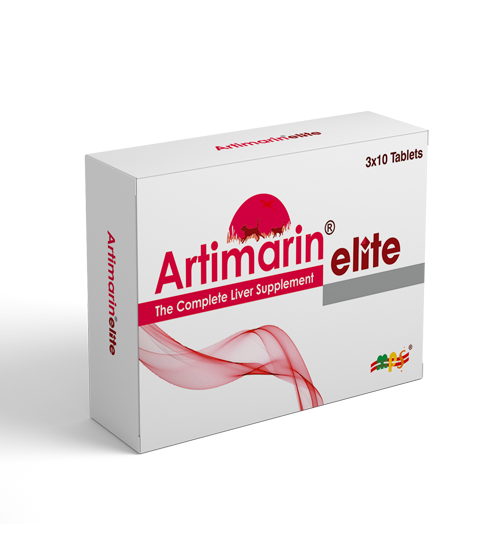Artimarin Elite

Artimarin Elite
Synergistic blend of
• Sylimarin
• CoenzymeQ-10
• N-Acetylcysteine
• Artichoke
• L-Ornithin L-Aspartate
• Inositol
• Vitamin B1,B2,B6
Suggested in :
• Animal Suffering from liver disorders,
• Animal recupertaining from Infectious disease
• Drug induced toxicity in liver.
• Gall Stones
• Irrritable Bowel Syndrome
• Supportive therapy in liver cirrhosis, fibrosis, hepatitis, jaundice, etc.
• Silymarin :
Silymarin is the extract of Silybum marianum, or milk thistle, and its major
active compound is silybin, which protects the liver against toxins, activates
protein synthesis, and stimulates growth of new liver cells to replace those that are
dead or damaged. It also has strong antioxidant (destroys oxygen free radicals)
and anti-inflammatory actions.
It may be useful in preventing or treating gallstones by thinning the bile. Many
dogs with inflammatory bowel disease (IBD) have concurrent inflammation of the
liver/bile system and the pancreas. This suite of symptoms is called “triaditis” .
Because silibin’s beneficial actions concentrate on the liver and bile systems, it may
also be helpful in dogs with IBD.
Silibin has ability to preserve the supply of another important antioxidant,
glutathione. which is stored primarily in the liver, naturally declines over time, and
depletion of this protein appears to accelerate the aging process.
One study demonstrated that silymarin binds to a steroid receptor and it is
hypothesized that structural similarity with steroids permits binding. Silymarin then,
like steroids, may be able to modulate RNA synthesis. Additionally, one study in
rats suggested that silymarin can also enhance deoxyribonucleic acid synthesis and,
therefore, possibly enhance hepatocyte regeneration. Thus far, one study
demonstrated hepatocyte regeneration in rats with silymarin.
• Artichoke :
Artichoke flower extract has three active constituents, cynarin, luteolin, and
chlorogenic acid, that serve as a pre- and probiotic to aid in digestion, as an
antioxidant to support the hepatic, biliary, and cardiovascular systems, and also as
a diuretic for renal support.
The action of artichoke on the liver begins with bile, but it certainly doesn’t end
there. Artichoke extracts may help to protect the liver from various toxic assaults
such as peroxides and carbon tetrachloride. Artichoke’s benefits on liver are often
attributed to the antioxidant activity of the caffeoylquinic acid phenolic compounds
and flavonoids such as luteolin and apigenin. Artichoke extract may be able to
defensive glutathione levels in the liver, when exposed to oxidative stress.
• N-acetylcysteine (NAC) :
N-acetylcysteine (NAC) is a chemically modified form of the dietary amino acid
cysteine. NAC contain sulphur, and sulphur-containing amino acids function as
antioxidants. Other sulphur containing antioxidants is glutathione. Glutathione
levels are considered the most reliable indicator of the body's resistance to
oxidation, and NAC plays a role in glutathione metabolism. NAC acts as a precursor
to glutathione, NAC probably has more of a sparing effect on glutathione. That is,
it neutralizes oxidants in place of glutathione, allowing glutathione levels to be
maintained.
NAC is believed to reduce drug’s toxicity (Specially acetaminophen).
Acetaminophen, a commonly used anti-inflammatory and pain killer, is quite toxic
to small animals, especially cats. NAC has long been used to counteract the
anemia that occurs following oxidative damage by acetaminophen. Other potential
applications for NAC include the treatment of degenerative myelopathy, respiratory
disease, chronic renal failure and feline immune deficiency virus (FIV).
• Coenzyme Q10 (CoQ10) :
Coenzyme Q10 (CoQ10) is coenzyme is found in mitochondria, which is the
powerhouse of the cells in the body. The coenzyme acts as a neutralizing
antioxidant in the cell which protects the cell from damage and helps in
metabolism. The natural production of Q10 in body cells tends to diminish with age
and due to certain health conditions as well. Since it is an important antioxidant
required for metabolism and maintenance of the cell thus over time it becomes
essential to consume it in the form of supplements.
CoQ 10 is the key cofactor in electron transport chain. It was achieved
that CoQ10 by its anti-oxidant, anti-inflammatory, and anti-apoptotic effects can
have a therapeutic role in acetaminophen hepatotoxicity as well as metabolic-
stress-induced liver damage.
• L-Orinithin L-Aspartate :
L-Orinithin L-Aspartate is an amino acid that is mainly used in urea cycle in the
capacity of removing excess nitrogen from the body. It is also very important in the
removal of ammonia (NH3) by converting into urea, a waste product of cellular
metabolism, from the body. This is known as urea cycle or ornithin cycle.
It may effective in chronic liver disease and hepatic encephalopathy (poor brain
functioning) Cirrhosis is a chronic disorder of the liver. L-ornithine L-aspartate
lowers blood ammonia levels and so may have beneficial effects in
hepatic encephalopathy or help stop them developing it.
In acute liver failure (ALF), high blood ammonia levels have been documented
that correlate with mortality and complications. L-ornithine L-aspartate (LOLA)
reduces ammonia levels by increasing hepatic ammonia disposal and its peripheral
metabolism.
Ingredients (Per 10 ml) :
• Silymarin : 140 mg
• N-Acetylcysteine : 200 mg
• Artichoke : 70 mg
• L- Ornithine L-Aspartate : 50 mg
• CoenzymeQ10 : 10mg
• Inositol : 10mg
• Vit.B1 : 1.4mg
• Vit.B2 : 1.6mg
• Vit.B6 : 1.2mg
Packing :
• Per box contains 3*10 Chewable Tablets
Suggestions for Use :
• 1 to 2 tablets three times a day or as directed by the veterinarian.
